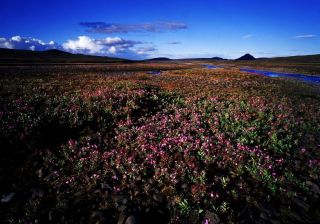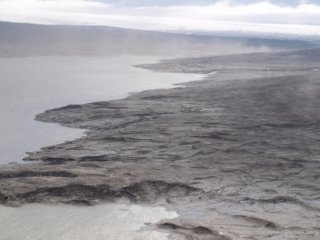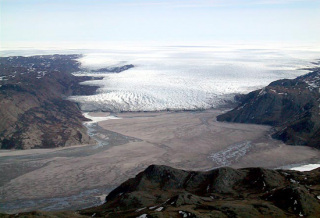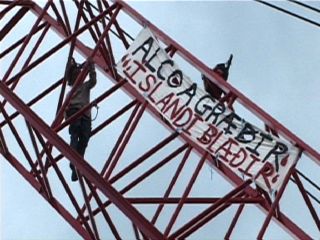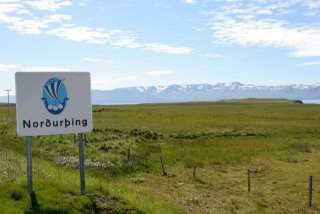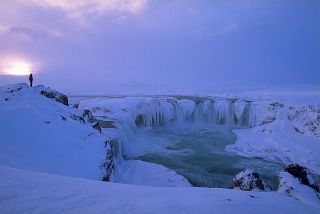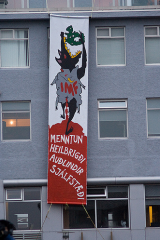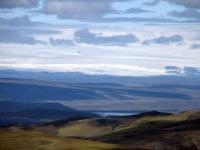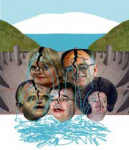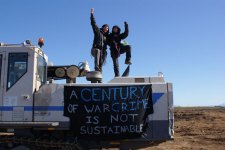'Jaap Krater'
Tag Archive
Dec 09 2011
4 Comments
ALCOA, Century Aluminum, Corruption, Dams, Democracy deficit, Ecology, Economic Collapse, Economics, Helguvík, Impregilo, Jaap Krater, Kárahnjúkar, Landsvirkjun, Media bias, Reykjavik Energy
The profitability of Landsvirkjun, Iceland’s national energy company, is way too low. And worst off is the Kárahnjúkar hydro power plant, Europe’s largest dam, the company’s biggest and most expensive construction. Landsvirkjun’s director Hörður Arnarson revealed this during the company’s recent autumn meeting, and blamed the low price of energy sold to large-scale energy consumers, such as Alcoa’s aluminium smelter in Reyðarfjörður, as one of the biggest factors reducing profit.
These news echo the many warnings made by the opponents of the cluster of five dams at Kárahnjúkar and nearby Eyjabakkar, who repeatedly stated that the project’s alleged profitability was nothing but an illusion, but were systematically silenced by Iceland’s authorities.
Now, as these facts finally become established in the media—this time straight from the horse’s mouth—similarly bad news has arrived regarding another big Icelandic energy company. Reykjavík Energy has failed to make a profit from their 2007 and 2008 investments, effectively making them lose money.
At the same time, new research shows that the environmental impacts of the Kárahnjúkar dams are exactly as vast and serious as environmentalists and scientists feared.
And yet, more dams, geothermal power-plants and aluminium smelters are on the drawing table—presented as the only viable way out of the current economic crisis. Read More
Apr 14 2011
4 Comments
ALCOA, Corruption, Democracy deficit, Economics, Energy Prices, Greenland, Impregilo, Jaap Krater, Kárahnjúkar, Landsvirkjun, Miriam Rose, Workers Rights
By Miriam Rose
After many years of preparations the Greenlandic government say the final decision on Alcoa’s proposed smelter will be taken at the spring 2012 of the parliament. It is more likely, as the global history of the industry and the evidence in Greenland tells us, that the decision has in fact already been made undemocratically behind closed doors, despite the decreasing support of the Greenlandic people. In fact Alcoa and the Greenland government are so keen on passing the project that they have just hired an eighth employee at their national company Greenland Development- formed to enable the industry to go ahead. Juaaka Lyberth’s explicit remit is to influence public opinion on the smelter through the media. Greenland Development paints a rosy picture of an aluminium future for Greenland, but will their promises of prosperity come true? A comparison to Alcoa’s Fjardaal project in East Iceland suggests that many will not. Read More
Mar 05 2011
1 Comment
ALCOA, Bjarnarflag, Climate Change, Geothermal Energy, Jaap Krater, Jökulsá á Fjöllum, Krafla and Þeistareykir, Landsvirkjun, Saving Iceland, Skagafjörður, Skjálfandafljót
By Jaap Krater
Last spring ALCOA released the first draft of the joint environmental impact assessment for the proposed Bakki smelter and power plants at Krafla and Theistareykir. Recently Iceland’s National Planning Agency commented on the draft assessment in a damning commentary.
The agency stated that the environmental impacts of the project are high and cannot be mitigated. 17,000 ha of untouched wilderness will be affected. Greenhouse gas emissions of the project would constitute 14% of Iceland’s total. There is a great deal of uncertainty on the full impact of the planned power plants and particularly on how much geothermal energy can be sustainably produced. Finally, the assessed energy projects will not be able to fully power the smelter, with 140 MW of capacity missing.
This confirms three key points of critique on the smelter that we have been voicing for several years now. Read More
Feb 06 2011
2 Comments
ALCOA, Bakki, Bjarnarflag, Geothermal Energy, Gjástykki, Jaap Krater, Krafla and Þeistareykir, Landsvirkjun, Saving Iceland
Alcoa still plans to build an aluminium smelter in Bakki by Húsavík, north-Iceland, according to the newspaper Fréttablaðið. This contradicts recent news, published in the business newspaper Viðskiptablaðið, saying that Alcoa was about to withdraw the idea due to the government’s alleged unwillingness to go ahead with it. Questions about energy to run the smelter are still unanswered but recent comments from the National Planning Agency, concerning the project’s joint Environmental Impact Assessment (EIA), state that enough geothermal energy can not be produced for the smelter; and certainly not in a sustainable way.
Read More
Nov 29 2010
1 Comment
ALCOA, Bakki, Climate Change, Jaap Krater, Jökulsá á Fjöllum, Krafla and Þeistareykir, Saving Iceland, Skagafjörður, Skjálfandafljót
November 25th, the joint Environmental Impact Assessment (EIA) on Alcoa’s planned 346 thousand ton aluminum smelter at Bakki, Húsavík, was finally published. In response, Iceland’s National Planning Agency released an extremely critical commentary regarding the planned smelter and the geothermal plants that are supposed to power it.
It states that:
– Environmental impacts of the project are high and cannot be mitigated.
– 17,000 ha of untouched wilderness will be affected
– Greenhouse gas emissions of the project would constitute 14% of Iceland’s total.
– There is a high amount of uncertainty regarding the full impact of the planned geothermal power plants and particularly their impact of the geothermal energy resource base.
– The assessed energy projects are not sufficient to power the smelter, with 140 MW of capacity missing.
“These reports confirms three key elements of critique that Saving Iceland voiced now several years ago,” says Jaap Krater, a spokesperson for Saving Iceland. Read More
Nov 17 2009
4 Comments
ALCOA, Alterra Power/Magma Energy, Amazon, Arms Industry, Bakki, Century Aluminum, Climate Change, Ecology, Economics, Geothermal Energy, Greenwash, H.S. Orka, Helguvík, Jaap Krater, Landsvirkjun, Mining, Miriam Rose, Reykjavik Energy, Rio Tinto Alcan, Saving Iceland, South Africa
By Jaap Krater and Miriam Rose
In: Abrahamsky, K. (ed.) (2010) Sparking a World-wide Energy Revolution: Social Struggles in the Transition to a Post-Petrol World. AK Press, Edinburgh. p. 319-333
Iceland is developing its hydro and geothermal resources in the context of an energy master plan, mainly to provide power for expansion of the aluminium industry. This paper tests perceptions of geothermal energy as low-carbon, renewable and environmentally benign, using Icelandic geothermal industry as a case study.
The application of geothermal energy for aluminium smelting is discussed as well as environmental and human rights record of the aluminium industry in general. Despite application of renewable energy technologies, emission of greenhouse gases by aluminium production is set to increase.
Our analysis further shows that carbon emissions of geothermal installations can approximate those of gas-powered plants. In intensely exploited reservoirs, life of boreholes is limited and reservoirs need extensive recovery time after exploitation, making geothermal exploitation at these sites not renewable in the short to medium term. Pollution and landscape impacts are extensive when geothermal technology is applied on a large scale.
Krater and Rose – Development of Iceland’s Geothermal Energy – Download as PDF
The full publication will be available from Jan. 15, 2010. ISBN 9781849350051.
Apr 07 2009
ALCOA, Alterra Power/Magma Energy, Andri Snaer Magnason, Century Aluminum, Corruption, Democracy deficit, Economic Collapse, Economics, Energy Prices, Geothermal Energy, Jaap Krater, Kárahnjúkar, Landsvirkjun, Reykjavik Energy, Rio Tinto Alcan, Saving Iceland
John Perkins, the author of
The Confessions of an Economic Hitman, is currently in Iceland. Perkins is here to be at the premier screening of
The Dreamland, a documentary based on Andri Snær Magnason’s book, also titled
The Dreamland. Last Sunday, Perkins was interviewed in a political TV show on RÚV (the state television station) where he spoke about the threat of Icelandic resources being sold to foreign corporations and advised Icelandic authorities not to collaborate with the International Monetary Fund (IMF).
Perkins used to work for the U.S. National Security Agency and his job included “to convince poor countries to accept enormous development loans – and to make sure that such projects were contracted to U.S. companies,” as says on the back cover of his book. Perkins states that Iceland is the first ‘developed’ country in the world to be hit by the ‘Economic Hitmen’, referring to the invasion of the aluminium industry in Iceland. Read More
Nov 11 2008
Economic Collapse, Jaap Krater, Landsvirkjun, Rio Tinto Alcan, Tungnaá
Landsvirkjun, Iceland’s national energy company, has announced that the tender offer of the dam
Búðarhálsvirkjun will be delayed because of the current economical situation. This means that the planned expansion of Rio Tinto Alcan’s aluminium smelter in Straumsvík will also be delayed. Construction of
Búðarhálsvirkjun, which was stopped a number of years ago, will dam the Tungnaá River, close to the lake Langisjór.
The construction of Búðarhálsvirkjun is expected to be around 25 billion ISK and the 85 MW dam is supposed to power R.T. Alcan’s increased production in Straumsvík, Hafnarfjörður. R.T. Alcan hopes to increase its production by 40 thousand tons per year without enlarging the smelter. But the company also hopes to enlarge the smelter further, though the people of Hafnarfjörður voted against it in a 2007 referendum, or to construct a new smelter i Thorlakshofn. The dam is also meant to create power for Verne Holdin’s data center to be built in Reykjanesbær. Read More
Oct 26 2008
3 Comments
ALCOA, Century Aluminum, Economic Collapse, Economics, Energy Prices, Jaap Krater, Kárahnjúkar, Landsvirkjun, Norsk Hydro, Rio Tinto Alcan, Saving Iceland
Jaap Krater, Morgunblaðið, 26-10-2008
In times of economic crisis, it is tempting to embrace new megaprojects such as new power plants and aluminium smelters. But will this realistically improve Iceland’s economic prospects?
Prime minister Geir Haarde recently explained on Stöd 2’s chat show Mannamál that one of the main reasons for the fall of the Krona, was due to the execution of heavy industry projects: the construction of Kárahnjúkar and Alcoa’s smelter in Reyðarfjörður. If more large projects are executed, what will the cost be for the Icelandic taxpayer?
Haarde’s comments were not surprising. Before construction of Kárahnjúkar many economists predicted the negative impact on inflation, foreign debt and the exchange rate of the ISK.
Of course there is some economic benefit from new smelters, but “it is probably outweighed by the developments’ indirect impact on demand, inflation, interest rates and the ISK exchange rate,” stated a report by Glitnir in 2006 on the impact of aluminium expansion in Iceland. The report expected an increase in inflation and a depreciation of the ISK.
“Kárahnjúkar will never make a profit, and the Icelandic taxpayer may well end up subsidising Alcoa,” said the eminent economist Thorsteinn Siglaugsson after publishing another report on the profitability of the Alcoa dam in East Iceland before construction commenced. Read More
Oct 23 2008
Century Aluminum, Economic Collapse, Economics, Jaap Krater, Saving Iceland
Century Aluminum announced in a statement it is reconsidering the planned smelter in Helguvík. It said it has stopped making any new capital commitments due to the global financial crisis.
“In the current environment, we have ceased making any new capital commitments and are reducing project spending. We believe the potential exists for a prudent way forward over time, but will soberly evaluate the feasibility of all elements of the project during the near term,” (1) said Logan Kruger, Century’s CEO.
While Century Aluminum’s revenue for the third quarter of 2008 rose due to an increase in aluminium shipments (2), prospects were deemed less rosy. Merrill Lynch downgraded Century Aluminum’s investment rating to ‘underperform’. It said aluminium pricing is weak, inventories of the metal are high and there are little catalysts to drive the price up.
“Some might think this is bad news for Iceland and that a new smelter could help with the economic crisis. But when we looked at what happened with Alcoa Fjardaal and Karahnjukar, a cancellation of Helguvik may be a blessing in disguise,” says Saving Iceland’s Jaap Krater. Read More
